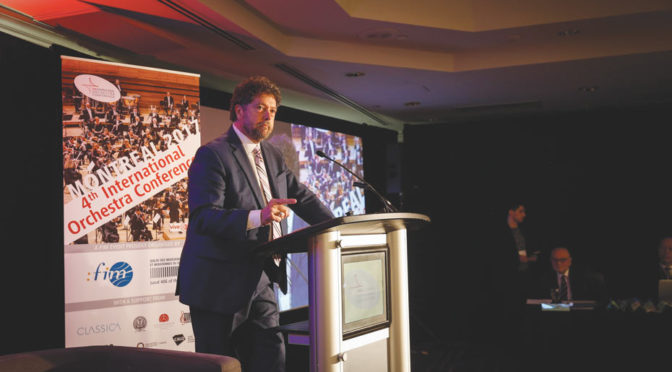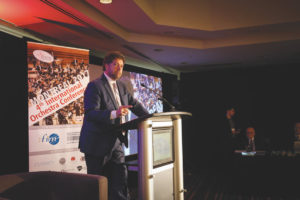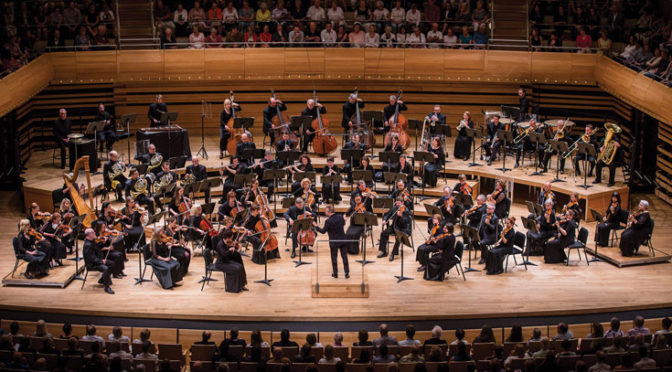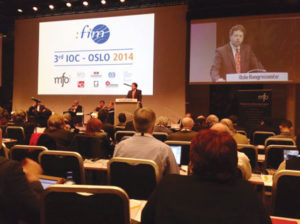by Naomi Bensdorf Frisch, ROPA Delegate to FIM IOC and Member of Local 10-208 (Chicago, IL) and Local 166 (Madison, WI)
The fourth International Federation of Musicians (FIM) International Orchestra Conference (IOC) was held May 11-14 in Montreal, Quebec. Musicians and managers from six continents gathered at the Delta Hotel for three days of intense discussions about the challenges faced and successes achieved by orchestras around the world. The AFM brought a strong group of delegates to the conference: President Ray Hair; Vice President from Canada Alan Willaert; Secretary-Treasurer Jay Blumenthal; International Executive Board member and Local 802 (New York City) President Tino Gagliardi; Symphonic Services Director Rochelle Skolnick; Symphonic Electronic Media Director Deborah Newmark; ICSOM Chair Meredith Snow; OCSM President Robert Fraser; and I served as the ROPA representative.
An opening reception honored Air Canada with the FIM Airline of Choice Award for accommodating musicians traveling with their instruments. The next morning opened with a lively speech by AFM President Hair who called for orchestra musicians to receive a share of ad revenue generated from orchestras’ pages and posts on online streaming services. Next, Allison Beck, former Federal Mediation & Conciliation Service director, delivered an inspirational keynote speech. She urged the delegates from all over the world to stay strong in this difficult political climate and keep working together to promote our missions. Recalling how Ford was able to pull out of the recession through good labor relations with the United Auto Workers, Beck reminded us that a good labor-management relationship is a “port in your storm,” and when musicians and managers are able to work together “anything is possible.”
Over the course of the three-day conference, eight topics were presented in panel discussion format: 1) The Public Value of Orchestras; 2) Business Models of Orchestras; 3) Orchestras Integrating Digital Tools and New Approaches; 4) Responsibility and Accountability: Role of Musicians on Orchestra Boards; 5) Bullying and Harassment; 6) Practical Aspects of Outreach and Education; 7) Recorded Broadcasts and Rights of Musicians; and 8) The Role of Trade Unions in Safeguarding the Future of the Orchestra. Each panel comprised four speakers (each from a different country) and a moderator. Panelists generally discussed what was working or not working in their home countries regarding each of the topics, allowing an opportunity for the delegates to learn from global experiences.
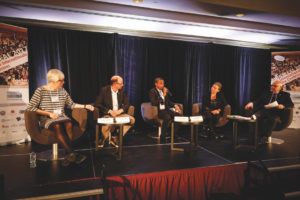
At the FIM IOC AFM Secretary-Treasurer Jay Blumenthal (far right) moderated a panel on The Public Value of Orchestras. Panel members (L to R) were: Katherine Carleton (Canada), Hans Reinhard Biere (Germany), Benedictus Acolatse (Ghana), and Déborah Cheyne (Brazil).
Some panels had widely different views, for instance, the panel on digital tools. One musician spoke about using digital conferencing to provide outreach and education services, another musician spoke about embracing smart phones in the concert hall, and an archivist from the New York Philharmonic shared her experience creating a digital catalogue of the orchestra’s music. I spoke on the panel about the role of musicians on orchestra boards. In the beginning, the four of us seemed to have very different approaches. By the end of the conversation, however, we all agreed that, though communication between the board and musicians is very important, musicians should not hold seats on orchestra boards. Overall, the panel discussions allowed for the presentation of many different perspectives, which, when supplemented by questions and comments from the delegates, painted a picture of how orchestras are surviving in today’s world.
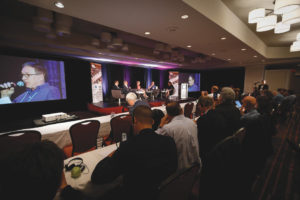
FIM IOC attendees listen to a panel on Bullying and Harassment in the Workplace. On stage (L to R) are: Michael D. Wright (Canada), Simon Webb (United Kingdom), Kaisa Rönkkö (Finland), Thomas Bjelkerud (Sweden), and moderator Rochelle Skolnick, AFM Symphonic Services Division director. During the conference, translation was provided in English, Spanish, and French.
The “Oslo Call,” established at the third FIM IOC in 2015, calls on musicians and managers around the world to become active in their communities and lobby politicians to help the arts to thrive. In Montreal, the fourth FIM IOC took the Oslo Call one step further, urging solidarity among musicians around the world and advocating for transparent, trusting relationships between orchestra managers and musicians. Delegates left the conference with an understanding that they are not alone; that they have colleagues to lean on in times of need. But further, it is apparent that, though we all have our roles to play, orchestras thrive when the union, musicians, managers, and board (or the government, in the case of our subsidized colleagues in Europe) have a healthy working relationship.
We need to work together to make ourselves relevant and valuable in our communities; to run our organizations responsibly and with good stewardship; to stop bullying, harassment, and exploitation of musicians around the world; and to ensure our own bright futures. Thanks to ROPA and to the AFM for allowing me to be a part of such a special event.


